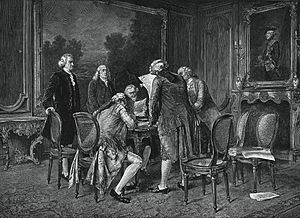 |
| Signing of the preliminary Treaty of Paris, 1782 |
By Roseanna M. White
It was 1783. The Treaty of Paris had been written, peace was a tenuous string between England and America. There was a deadline for getting the document signed, ratified, and returned to France, where Benjamin Franklin was waiting to present it to the English delegates. The hopes and fears of two nations were on the line.
And the document sat, unsigned, in Annapolis, Maryland, where the Congress was meeting. It sat, and it waited, while delegates from the 13 newly-christened states failed, and failed again to show up.
When I was writing Love Finds You in Annapolis, Maryland many moons ago, I kept reading about how the delegates weren't there, but it took me a long time to find something that told me why. And given the "snowpocalypse" that just closed in on Maryland again this past week, it seemed like an appropriate time to tell y'all about it. =)
I lived in Annapolis for 6 years, so I knew what normal winter weather looked like for the town. Windy. Very, very windy. Nasty windy. Cold. The occasional just-above-freezing rain, a few days of ice. Snow once a year or so. Overcast aplenty, but some days of nice sunshine too.
Not so in the winter of 1783-84. No, Jefferson and Franklin both termed this "the long winter of 1783-84," and Jefferson further added that it was "severe beyond all memory." Even the oldest men alive at the time couldn't remember a winter that was worse for the eastern seaboard. The snow kept coming. And coming. The temperatures were frigid.
.jpg/220px-Laki_fissure_(2).jpg) |
| The Laki fissure, from which toxic gases fumed |
So as we sit beneath our three feet of snow in 2016 and watch the plows come through, as we thank the Lord that electricity has stayed on and our houses are snug, I can't help but think back to the winter that nearly kept peace from being ratified, and the snows that trapped delegated and statesmen in their homes for weeks and months.
Even after they eventually made it to Annapolis and ratified the Treaty, the ordeal wasn't over. The ships meant to carry it across the Atlantic were iced in well past the deadline...but Franklin managed to get said deadline extended. And since the winter was just as brutal in Europe, everyone was understanding...and very ready for peace.
That long winter of 1783-84 recorded the most below-zero temperatures ever in New England. The most snow in New Jersey. The Chesapeake Bay was frozen solid. The Mississippi River froze at New Orleans, and there was even ice in the Gulf of Mexico.
But peace prevailed. The people hunkered down and got through. And now, all these many years later, we can rest safe and warm inside.
he
occasional just-above-freezing rain, a few days of ice. Snow once a
year or so. Overcast aplenty, but some days of nice sunshine too. - See
more at:
http://roseannamwhite.blogspot.com/2011/02/remember-when-snow-wouldnt-stop.html#sthash.XBlMYg2t.dpuf
he
occasional just-above-freezing rain, a few days of ice. Snow once a
year or so. Overcast aplenty, but some days of nice sunshine too. - See
more at:
http://roseannamwhite.blogspot.com/2011/02/remember-when-snow-wouldnt-stop.html#sthash.XBlMYg2t.dpuf

This comment has been removed by the author.
ReplyDeleteThank you for the interesting post,Roseanna.So many concentrate on the war itself that I appreciate it when I can learn facts about the end of the Revolution.I also wanted to thank you for writing the wonderful book Love Finds You in Annapolis,Maryland.I love it! It's one of the best books about the Post Revolutionary period I ever read!!
ReplyDeleteAw, thank you so much, Lynne! So glad you enjoyed Lark and Emerson's story--and learning all about the post-war days was so awesome!
DeleteWow! Great post Roseanna. I learned something new about that time and never even considered the weather or how bad it was for them.
ReplyDeleteI too love your book, Love Finds You in Annapolis, Maryland.
Still digging out from under all that snow...38 inches!
Blessings,Tina
Wowzers, Tina!! That is a LOT.
DeleteGood stuff! Yeah, we whine about how "hard" we have it. *snort* Our colonial ancestors would be ashamed of us.
ReplyDeleteYeah... *sigh*
DeleteWow, I live near the Chesapeake Bay and I cannot imagine it being frozen over!!! I wonder if that has ever happened since that time. Sounds brutal. I'd not thought of that horrid winter as associated with the signing. Thanks for the great post!
ReplyDeleteI don't think it's happened since, no. Crazy, huh?
DeleteThanks Roseanna for a fascinating post.One of my sons is a meteorology and oceanographic officer in the Navy.Weather has played a vital role in all our wars and it continues to today.
ReplyDeleteIt definitely does! Always so interesting to learn about too.
DeleteLove it. Weather plays a part in alot of things people just choice not to believe it. Not me i know weather plays a roll in alot of things.
ReplyDeleteAbsolutely. =)
DeleteAbsolutely fascinating! Living in MN, I know weather affects many things, so this is particularly interesting! Thanks so much for sharing, Roseanna :)
ReplyDeleteOh yes. And it can definitely dictate entire lifestyles, when it's the norm...and cause major issues when it isn't!
DeleteVery interesting! Thanks for sharing.
ReplyDeleteI was surprised I hadn't posted about this before! I'd had a version of it on my personal blog back in 2011 and thought for sure I'd rewritten it for the CQ. Glad I hadn't, LOL. Perfect time for this one. =)
Delete